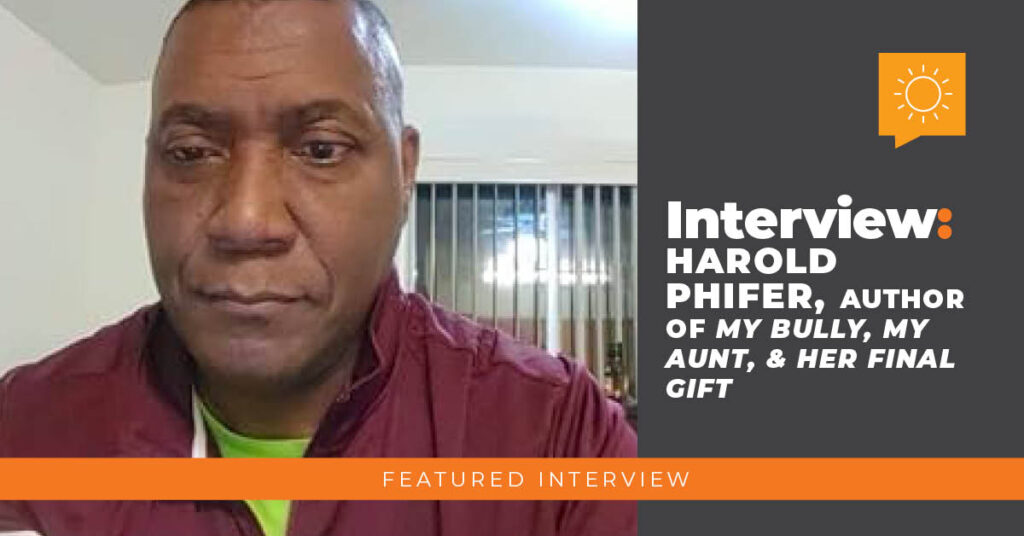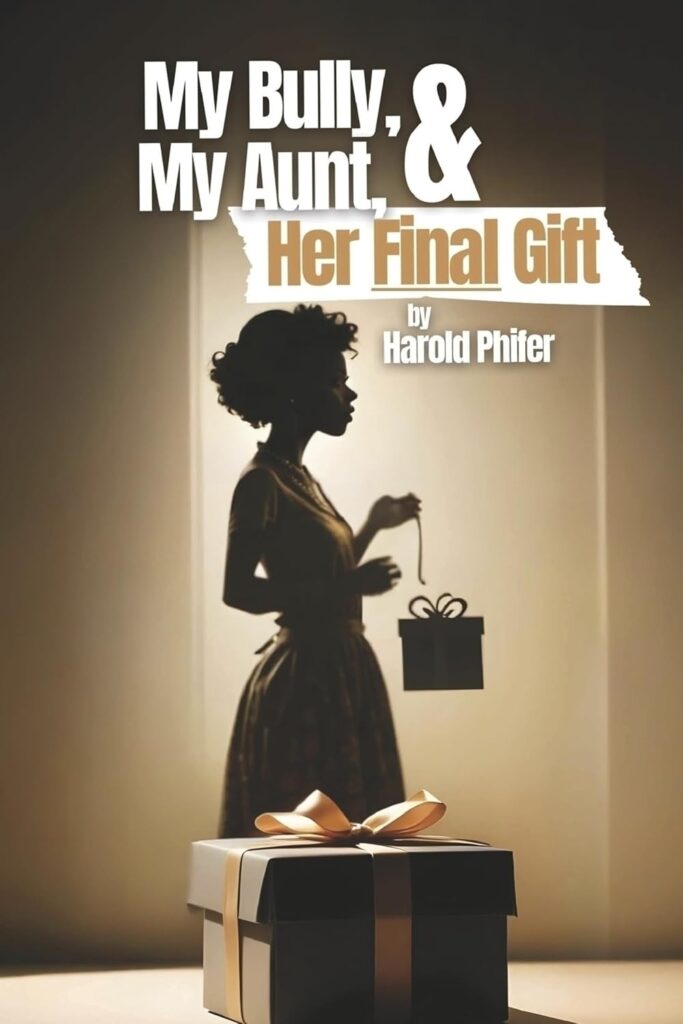Author of My Bully, My Aunt, & Her Final Gift
By Sarah Kloth

Memoir asks a writer to step into the most vulnerable corners of memory, to put shape and language to experiences that are often left unspoken. In My Bully, My Aunt, & Her Final Gift, Harold Phifer does exactly that, tracing the complicated family dynamics that shaped him, particularly the influence of his formidable Aunt Kathy. What emerges is a story of hardship, resilience, and ultimately healing. We spoke with Harold about revisiting the past, finding humor amid pain, and why some stories demand to be told.
Your book, My Bully, My Aunt, & Her Final Gift, has such a personal and evocative title. Titles like that often spark curiosity. Can you share what inspired you to write this story and how it connects back to your earlier work?
HP: Actually, it’s a spinoff of Surviving Chaos: How I Found Peace at a Beach Bar. Aunt Kathy was my antagonist in that book. After so many queries about her, I realized people were curious and would read about the person who tried to suppress my drive.
Without giving too much away, what is the core message or takeaway you hope readers gain from this book?
HP: I Sometimes, the villain is a relative! But regardless of any obstacles, stay the course and believe in yourself.
The book deals with themes of bullying, family, and personal growth, which can be heavy but also relatable for many readers. How did you find the balance between telling your truth and keeping the tone approachable?
HP: I knew I needed to pull back some of the daggers for fear of coming off as too resentful and mean-spirited. So, I made sure to spread all the humor and zaniness I could muster. Through it all, I wouldn’t have written the book without showing personal growth and the healing that came after the passing of Aunt Kathy.
Family relationships, especially personal experiences with your family influence the way you told this narrative?
HP:I had a weak connection with all of my relatives because Aunt Kathy deemed it that way. They all stayed at a distance because of her. Since I had to exist outside of any tutelage or mentoring from other relatives, My Bully, My Aunt, & Her Final Gift allowed me an opportunity to expose those dastardly ways.
Bullying can leave lasting emotional scars, especially when it comes from within the family. What was it like for you to revisit these experiences during the writing process?
HP: Walking down memory lane was painful at times. I couldn’t help but think of what could have been! I know I’m patched up and able, but the scars remain.
Your aunt plays such a pivotal role in the book. Looking back, how has your perspective on her changed over time? Did writing about her bring any new understanding?
HP: Aunt Kathy had no children and had to care for her younger brothers and sisters at a young age. Those are pretty big whammies. It explained why she was bullish and selfish.
The book seems to wrestle with the complexities of forgiveness and healing. Do you believe all wounds can heal, or are some relationships too fractured?
HP: I have to agree some relationships are too broken to ever be repaired. You just have to find ways to cope and avoid picking at the soft spot.
Memoirs often require revisiting deeply personal moments. What was the most challenging scene for you to write, and why?
HP: Writing about my mom and her schizophrenia is always hard. She was never at peace, which kept me on edge as well. I had very few good days around her.
Many writers find the act of writing cathartic. Did you experience that while working on this book? What emotions surfaced as you put these memories onto the page?
HP: No doubt, My Bully, My Aunt, & Her Final Gift was therapeutic for me. We knew we were poor; yet, my brothers and I were tightly knitted until Aunt Kathy drove the stake that forced us apart. That division carried well into adulthood and hindered my sibling growth and success. It’s something I’m aware of, whereas my brothers are not.
Memoirs require vulnerability, and sometimes authors hesitate to share the most personal details. Were there moments where you questioned how much to reveal?
HP: It was hard to rehash that I never received a Christmas gift until I bought my own at the age of 14. I knew Aunt Kathy made sure my brother Jerry never missed out on anything, birthdays included. So, pulling back that onion made me kind of sad. Yet, it explains why I tend to splurge on myself and why I have obsessive behavior.
Memoir does not always offer tidy resolutions. What it can offer is perspective, and perhaps a measure of peace. In telling the story of his aunt—the bully, the antagonist, and ultimately the complicated figure whose presence shaped so much of his life—harold phifer finds a way to claim his own narrative. My bully, my aunt, & her final gift is not just about one difficult relative, but about the resilience that comes from writing through pain and finding clarity on the other side.

My Bully, My Aunt, & Her Final Gift
Harold Phifer
In “My Bully, My Aunt, and Her Final Gift”, Hal revisits the complicated relationship he shared with his late Aunt Kathy, a woman who stood as the antithesis of positivity in his life. Despite her domineering and often cruel behavior, her passing left Hal with an unexpected opportunity for humor, healing, and reflection.
As he plans her memorial―a gathering that no one seems eager to attend―Hal’s childhood memories resurface, pulling him back into a world shaped by his aunt’s unpredictable rules and twisted philosophies. Blending heartfelt truths with laugh-out-loud moments, Hal weaves a tale of resilience, self-discovery, and ultimately, redemption. This memoir offers a lighthearted yet honest look at how even the darkest relationships can leave behind gifts of wisdom and self-awareness.

